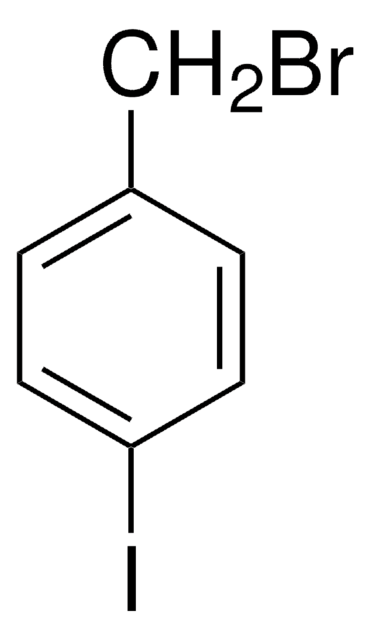427691
3-Iodobenzyl bromide
95%
Sinónimos:
α-Bromo-m-iodotoluene, 1-(Bromomethyl)-3-iodobenzene, 3-(Bromomethyl)iodobenzene, m-Iodobenzylbromide
About This Item
Productos recomendados
Análisis
95%
mp
46-51 °C (lit.)
cadena SMILES
BrCc1cccc(I)c1
InChI
1S/C7H6BrI/c8-5-6-2-1-3-7(9)4-6/h1-4H,5H2
Clave InChI
BACZSVQZBSCWIG-UHFFFAOYSA-N
Categorías relacionadas
Descripción general
Aplicación
It may be used in the synthesis of the following:
- meta-substituted phenylalanine derivatives
- N6-substituted aristeromycin derivative
- (N)-methanocarba-N6-(3-iodobenzyl)adenosine
Palabra de señalización
Danger
Frases de peligro
Consejos de prudencia
Clasificaciones de peligro
Eye Dam. 1 - Skin Corr. 1B
Código de clase de almacenamiento
8A - Combustible corrosive hazardous materials
Clase de riesgo para el agua (WGK)
WGK 3
Punto de inflamabilidad (°F)
235.4 °F - closed cup
Punto de inflamabilidad (°C)
113 °C - closed cup
Equipo de protección personal
Eyeshields, Faceshields, Gloves, type P3 (EN 143) respirator cartridges
Certificados de análisis (COA)
Busque Certificados de análisis (COA) introduciendo el número de lote del producto. Los números de lote se encuentran en la etiqueta del producto después de las palabras «Lot» o «Batch»
¿Ya tiene este producto?
Encuentre la documentación para los productos que ha comprado recientemente en la Biblioteca de documentos.
Nuestro equipo de científicos tiene experiencia en todas las áreas de investigación: Ciencias de la vida, Ciencia de los materiales, Síntesis química, Cromatografía, Analítica y muchas otras.
Póngase en contacto con el Servicio técnico









